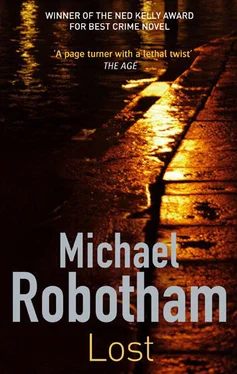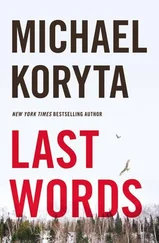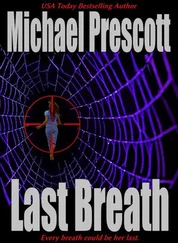“I don't know. He didn't follow me from the hospital and nobody knew I was going to Wormwood Scrubs. Maybe someone called him from the prison.”
I close my eyes and replay events. I'm totally flying but can still think straight. Snatches of conversation drift back to me.
“God is going to set me free.” That's what Howard said.
If Howard sent the ransom demand why did he wait so long? He could have set up a hoax during his trial or at any stage since then. He would have needed help from the outside. Who?
The Home Office keeps a record of all visitors to Her Majesty's prisons. Howard's eldest sister visits him every few months, traveling down from Warrington and staying overnight at a local B & B. Apart from her there's only been Rachel.
In the first few months after his conviction he received bundles of fan mail. Many of the letters were from women who fell in love with his lonely countenance and his crime. One of them, Bettina Gallagher, a legal secretary from Cardiff, is a notorious pinup among the lifers. She sends pornographic photographs of herself and has twice been engaged to death row inmates in Alabama and Oklahoma.
Howard is allowed one free postage-paid letter a week but can buy more stationery and stamps from the prison shop. Each prisoner is also given a unique PIN number he must use when using the telephone. Pedophiles and child molesters can dial only approved numbers. Letters and calls are monitored.
These details rattle in the emptiness. I can't see Howard arranging a ransom drop—not from inside a prison cell.
“Give your eyes a chance,” my stepfather used to say when we were looking for newborn lambs on frosty nights. White on white is difficult to see. Sometimes you have to look past things before you really see them.
There used to be a really good comedian who called himself Nosmo King. I watched this guy for years and didn't realize where the name came from. NO SMOKING. Nosmo King. That's why you have to keep your eyes open. The answer can be right in front of you.
The Professor has opened his briefcase and pulled out a photograph album. The cover is frayed and silverfish have given it a mottled finish along the spine. I recognize it from somewhere.
“I went to see your mother,” he says.
“You did what!”
“I went to see her.”
My teeth are clenched. “You had no right.”
Ignoring me, he runs his fingers over the album cover. Here it comes—the search backward, the probing of my childhood, my family and my relationships. What does it prove? Nothing. How can another human being have any appreciation of my life and the things that shaped me?
“You don't want to talk about this.”
“No.”
“Why?”
“Because you're poking your nose into my business—you're screwing with my head.”
It takes me a moment to realize that I'm shouting at him. Thankfully, there's nobody around except the barman and the sleeping drunk.
“She doesn't seem very happy in the nursing home.”
“It's a fucking retirement village.”
He opens the album. The first photograph is of my stepfather, John Francis Ruiz. A farmer's son from Lancashire, he's dressed in his RAF uniform, standing on the wing of a Lancaster bomber. Already losing his hair, his high forehead makes his eyes seem bigger and more alive.
I remember that photograph. For twenty years it stood on the mantelpiece beside a silver jubilee picture frame and one of those tacky snowballs of St. Paul's Cathedral.
John Ruiz went missing over Belgium on July 15, 1943, while on his way to bomb a bridge in Ghent. The Lancaster was hit by German fighters and exploded in midair, dropping like a fiery comet.
“Missing in action. Presumed dead,” the telegram said. Only he wasn't dead. He survived a German POW camp and came home to discover that the “future” he had fought so hard to protect had run off and married an American catering corps sergeant and moved to Texas. Nobody blamed her, least of all him.
And then he met Sofia Eisner (or Germile Purrum), a “Jewish” seamstress with a newborn son. She was striding down the hill from Golders Green, between two young friends, their arms locked together, laughing.
“Don't forget now,” shouted the eldest of them. “We're going to meet the men we're going to marry tonight.”
At the cinema at the bottom of the hill they came across a group of young men waiting in the queue. One of them wore a single-breasted jacket with notched lapels and three buttons.
Germile whispered to her friends, “Which one's mine?”
John Ruiz smiled at her. A year later they were married.
Joe turns another page of the album. The sepia images seem to have soaked into the paper. There is a photograph of the farm—a plowman's cottage with small leadlight windows and doors so low my stepfather had to duck his head to get through them. My mother filled the rooms with bric-a-brac and souvenirs, managing to convince herself they were heirlooms of her vanished family.
Outside the plowed fields were milk-chocolate brown and smoke fluttered like a ragged white flag from the chimney. In late summer wheels of hay dotted the hillsides like spilled lozenges.
I can still smell the mornings sometimes—the burned toast, strong tea and the talcum powder my stepfather sprinkled between his toes before pulling on his socks. As he closed the door the dogs barking excitedly, dancing around his feet.
I learned all about life and death on the farm. I snipped the scrotums of newborn lambs and pulled out the testes with my teeth. I put my forearm deep in a mare, feeling for the dilation of the cervix. I killed calves for the freezer and buried dogs that were more like siblings than working animals.
There aren't any photographs of everyday workings on the farm. The album records only special occasions—weddings, births, christenings and anniversaries.
“Who's this?” Joe points to a picture of Luke, who is wearing a sailor's suit and sitting on the front stairs. His blond cowlick stands up like a flag fall on an old-fashioned taxicab meter.
The lump forming in my throat feels like a tumor. Covering my mouth with my fingers, I try to stop the alcohol and morphine from talking but words leak out through my open pores.
Luke was always small for his age but he compensated for it by being loud and annoying. Most of the time I was at boarding school so I only saw him during the holidays. Daj would tell me to keep an eye on him and at the same time she'd tell Luke to stop bugging me because he constantly wanted to play Old Maid and to look at my football cards.
In the depths of winter when it snowed I used to go tobogganing down Hill Field, starting off near the front door and finishing at the pond. Luke was too young so he rode on a toboggan with me. Several hillocks along the way would throw us in the air and he squealed with laughter, clinging to my knees.
The track leveled off toward the end and a mesh fence sagged between posts having been hit so many times by braced feet.
My stepfather had gone into town to get a thermostat for the boiler. Daj was trying to hand dye my bedsheets a darker color to hide the semen stains. I can't remember what I was doing. Isn't that strange? I can remember every other detail with the clarity of a home movie.
At bath time we noticed him missing. We used a spotlight powered by the tractor engine to search the pond but the hole in the ice had closed over.
I lay awake that night, trying to will Luke into being. I wanted him to be lying in his bed, snuffling in his sleep and twitching like a dog dreaming of fleas.
They found him in the morning beneath the ice. His face was blue, his lips bluer. He was wearing hand-me-down trousers and hand-me-down shoes.
I watched from my bedroom window as they laid him on a sheet and tucked another beneath his chin. The ambulance had mud-streaked arches and open doors. As they lifted the stretcher I went flying out of the front door, screaming at them to leave my brother alone. My stepfather caught me at the gate. He picked me up and hugged me so hard I could barely breathe. His face was gray and prickly. His eyes were blurred with tears.
Читать дальше












